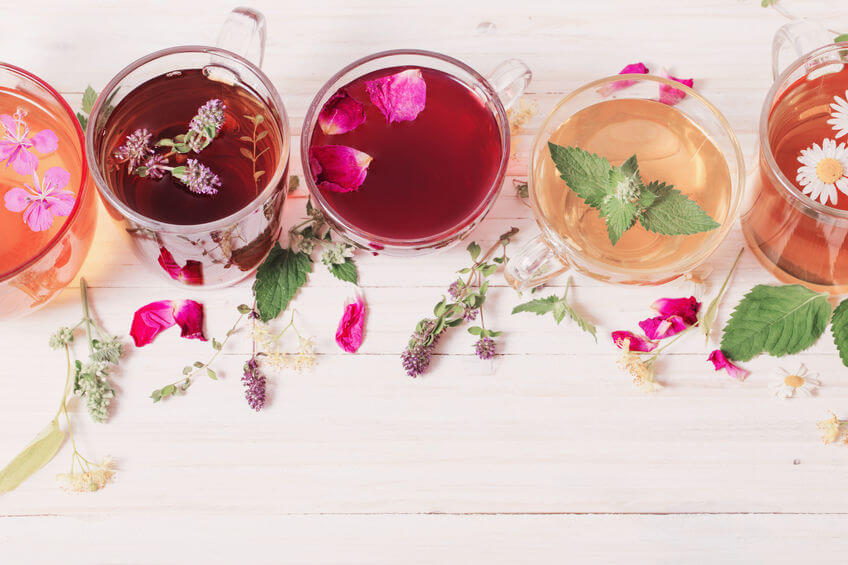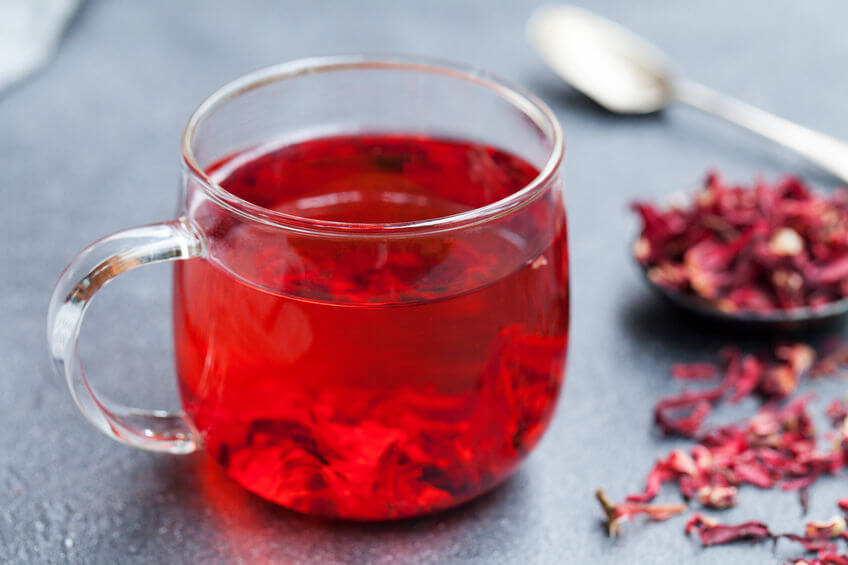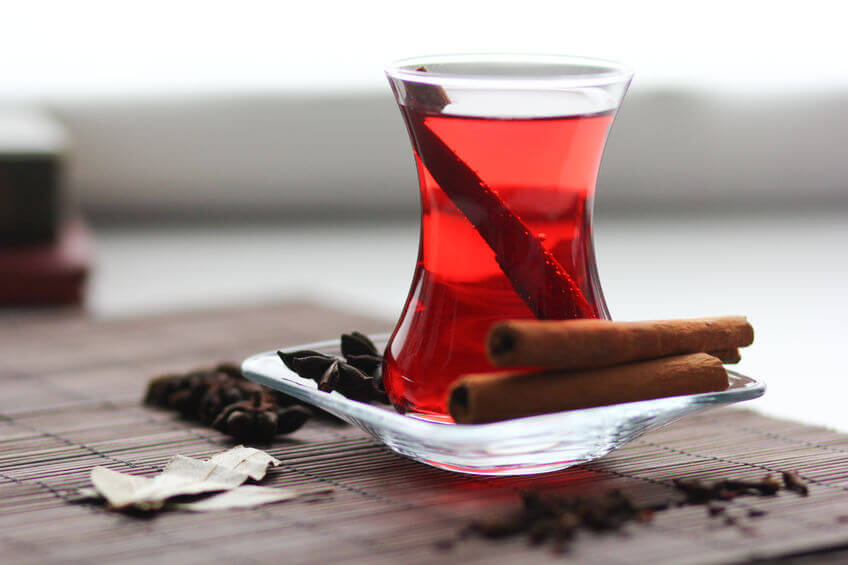Whether it be for taste or nutrition, herbal teas have been enjoyed for centuries. One of which would be hibiscus tea. When combined with cinnamon, it provides an exuberant flavor and many benefits. In this post we’ll be exploring some of the benefits of cinnamon hibiscus tea and why it may be worth your consideration.
Herbal Teas

Herbal teas aren’t really a tea as true teas (like black tea and green tea) are brewed using the leaves of the Camellia sinensis plant.
They are made using dried herbs, spices, flowers, and fruits – that means they don’t contain any caffeine. But there are many benefits that can make them a great alternative to plain water or sugar-filled beverages
Americans’ interest in herbal teas has been on the rise, with the American Botanical Council reporting an increase in sales for nearly every type of herbal with many looking for safe and affordable ways to enhance personal wellness.
Benefits Of Herbal Teas
Some herbal teas not only help you stay hydrated, which supports your good health, but they offer health-promoting properties of their own; which is why they’ve been used for thousands of years as a natural remedy for many different types of ailments.
This isn’t just folklore. Science has proven some of the traditional, medicinal uses for herbal teas (lemon basil tea, for example) that countless generations prior have long known.
For example, a scientific review published in the September 2019 issue of the journal Plant Foods for Human Nutrition analyzed herbal teas used for a variety of conditions such as heart disease, diabetes, and female health as well as weight loss.
They concluded that herbal teas contain a “wealth of compounds” that may play a key role in delivering important chemicals and nutrients to compensate for poor quality diets.
While herbal teas vary depending on their particular contents, most offer benefits that come as a result of antioxidants, vitamins, and minerals, among other nutrients.
They may help to reduce inflammation, lower the risk of disease, strengthen the immune system, aid in detoxification, support better digestive health, provide anti-anxiety effects, and more.
Cinnamon Hibiscus Tea
While each different herbal concoction can provide something unique of its own for supporting your good health, when it comes to the benefits of cinnamon hibiscus tea, you’ll enjoy many, along with a flavorful, warming beverage.
Cinnamon

Cinnamon has a tasty flavor and a sweet and spicy aroma that often brings pleasant memories of apple pie and the joys of fall.
Egyptians recorded their extensive use of the spice in Ebers Papyrus, a preserved medical text that dates to around 1550 BC.
Cinnamon has also long been used in Ayurvedic medicine as an antimicrobial compound to treat many different conditions, like digestive disorders, intestinal infections, diabetes, sinus congestion, headaches, menopausal issues, gynecological disorders, and more.
Hibiscus Tea

Hibiscus has been used by many different cultures for centuries as a remedy for multiple conditions.
It’s believed to have originated in Africa, with the Egyptians possibly bringing it to China, where it spread throughout Asia, according to a report from the University of Northern Iowa.
In Africa, it was used to make a tea to treat the symptoms of a cold, liver disease, cancer, and constipation.
Egyptians made hibiscus teas to treat nerve and heart conditions, as a diuretic, and to lower body temperature.
Benefits Of Cinnamon Hibiscus tea
The benefits of cinnamon hibiscus tea combines both nutritious ingredients to deliver what your mind and body are craving.
1. Powerful Antioxidants

Cinnamon is jam-packed with antioxidants, including polyphenols which are important to protect the body’s cells from damaging free radicals.
When you don’t consume enough polyphenols in your diet, free radicals can become rampant, resulting in cells that are unable to function properly. This can lead to degradation of tissues as well as increasing the risk of heart disease, cancer, Alzheimer’s, and other diseases. Premature signs of aging are more likely as well, such as fine lines and wrinkles.
In research published in the Journal of Agricultural and Food Chemistry that compared the antioxidant activity of 26 different spices, cinnamon came out as No. 1, even outranking well-known “superfoods” such as oregano and garlic.
More good news for those who combine cinnamon with hibiscus is that hibiscus offers potent antioxidants of its own, providing double the benefits when it comes to the tea’s ability to fight the harmful effects of free radicals.
In one animal study an extract of hibiscus increased the number of antioxidant enzymes while reducing the negative free radical effects by as much as 92 percent.
2. Anti-Inflammatory Properties

Inflammation is important as it helps the body repair tissue damage and fight off infections. But when inflammation becomes chronic, it can attack the body’s tissues.
Just some of the problems of chronic inflammation include hypertension, heart disease, cancer, asthma, inflammatory bowel disease, arthritis, and diabetes.
As both cinnamon and hibiscus contain polyphenols, they provide anti-inflammatory properties that can help lower of the risk of these chronic conditions or help to improve existing diseases.
3. Supporting Brain Health

Polyphenols promote better brain health and protect against dementia, which means that drinking cinnamon hibiscus tea can also help keep your mind functioning as it should, and possibly even prevent Alzheimer’s.
More than six million Americans have been diagnosed with Alzheimer’s disease, according to the latest statistics; including about one in nine who are 65 and older, and approximately one-third of people 85 and older have it.
There are also two compounds in cinnamon that have been found in research to inhibit the protein buildup of “tau” in the brain, one of the hallmarks of Alzheimer’s.
Additionally, an animal study conducted on mice that had Parkinson’s disease, showed that the spice aided in normalizing neurotransmitter levels and protecting neurons while improving motor function.
4. Promoting Weight Loss

Another benefit of cinnamon hibiscus tea involves the promotion of weight loss.
Multiple studies have suggested that hibiscus is linked to losing weight and might help protect against obesity.
A study involving overweight human participants found that after 12 weeks, those who took a hibiscus extract managed to reduce their body mass index (BMI), total body weight, fat, and hip-to-waist ratio.
Another experienced similar results with obese mice.
In addition, cinnamon has been shown to decrease blood sugar and increase insulin sensitivity which are both key for not only controlling type 2 diabetes, but for weight loss.
The spice is also believed to boost the metabolism, which also supports weight loss efforts, improving metabolic health by acting directly on fat cells, triggering them to burn energy through thermogenesis.
5. Improving Heart Health

Cinnamon has been shown in research to help lower “bad” LDL cholesterol and triglycerides while raising “good” HDL cholesterol. It’s also been found to reduce blood pressure.
Hibiscus provides similar benefits. In fact, one of its most well-known benefits is lowering blood pressure. A number of studies have shown that drinking hibiscus tea may reduce both systolic and diastolic blood pressure.
One study involving participants with high blood pressure showed that those who drank hibiscus experienced a dramatic reduction on systolic pressure compared to those who had a placebo.
When combined, all of those factors may improve heart health while significantly cutting the risk of heart disease.
6. Reducing Cancer Risk

Thanks to the high concentration of polyphenols in hibiscus and cinnamon, drinking a tea that combines the two may help prevent cancer.
Polyphenols have been shown to provide powerful anti-cancer properties. A study using hibiscus extract found that it reduced cancer cell growth in mouth cancers, while another reported it prevented prostate cancer cells in humans from spreading.
In scientific research on mice with colon cancer, cinnamon has been found to protect against further cancer growth.
7. Fighting Bacterial Infections

Both cinnamon and hibiscus contain properties that suggest they may fight bacterial infections.
For example, one study showed that hibiscus extract inhibited E. coli activity, a strain of bacteria known to cause diarrhea, gas, and cramping.
Cinnamon contains cinnamaldehyde, which has been found to inhibit the growth of certain bacteria, like Salmonella and even effectively treat respiratory tract infections
Enjoying the Benefits of Cinnamon Hibiscus Tea

This tea is easy to make. All you need are cinnamon sticks, dried hibiscus flowers, and water.
Combine and bring the mixture to a boil, and then reduce the heat to medium low.
Simmer for about five minutes, remove from the heat and allow it to infuse for several minutes before drinking. Enjoy!

